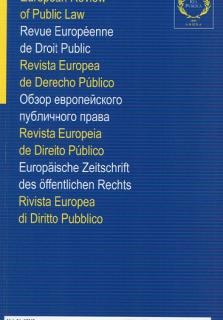
LA REGULATION DES RAPPORTS
ENTRE L'ORDRE CONSTITUTIONNEL FRANÇAIS
ET L'ORDRE JURIDIQUE DE L'UNION EUROPEENNE
PAR LE CONSEIL CONSTITUTIONNEL
THEODORA PAPADIMITRIOU
Docteur en droit public de l'Université Paris I Panthéon-Sorbonne
How can the application of EU law be conciliated with the respect of the Constitution of each Member State? The French Constitutional Council responds to this question in three steps: by constitutionalising the requirement of application of EU law in order for constitutional review to be limited to the hypothesis of an identity obstacle. Especially by transcribing into the national legal order a balance already contained in EU primary law. We have here the systemic interpretation of a relationship between legal orders in the framework of which the ad hoc application of a norm cannot be considered as being synonymous to a hierarchical prevalence of the legal order to which that norm belongs formally. As regulators of this relationship, the constitutional judge, the EU judge and, in perspective, the ECHR judge are called upon to judge what has become common and what remains specifically identitary. However, this balance, founded on judicial subsidiarity, remains subject to maintaining the absence of formal hierarchy between those courts, condition the realisation of which is currently in constant evolution.
Comment concilier application du droit de l'Union européenne et respect de la Constitution de l'Etat membre? A cette question le Conseil constitutionnel français répond en trois temps: constitutionnaliser l'exigence d'application de ce droit afin de limiter le contrôle de constitutionnalité à la seule hypothèse d'obstacle identitaire. Surtout, transcrire dans l'ordre interne un équilibre déjà contenu dans le droit primaire de l'Union. On a là l'interprétation systémique d'un rapport entre ordres juridiques au sein duquel l'application ad hoc d'une norme ne serait pas le synonyme de la prévalence hiérarchique de l'ordre juridique auquel cette norme appartient formellement. Régulateurs de ce rapport, le juge constitutionnel, le juge de l'Union et, dans la perspective, le juge de la CEDH sont appelés à trancher ce qui est devenu commun et ce qui reste spécifiquement identitaire. Or, cet équilibre fondé sur la subsidiarité juridictionnelle reste sujet au maintien de l'absence de hiérarchie organique entre les juridictions concernées, condition dont la réalisation est actuellement en pleine évolution.





















